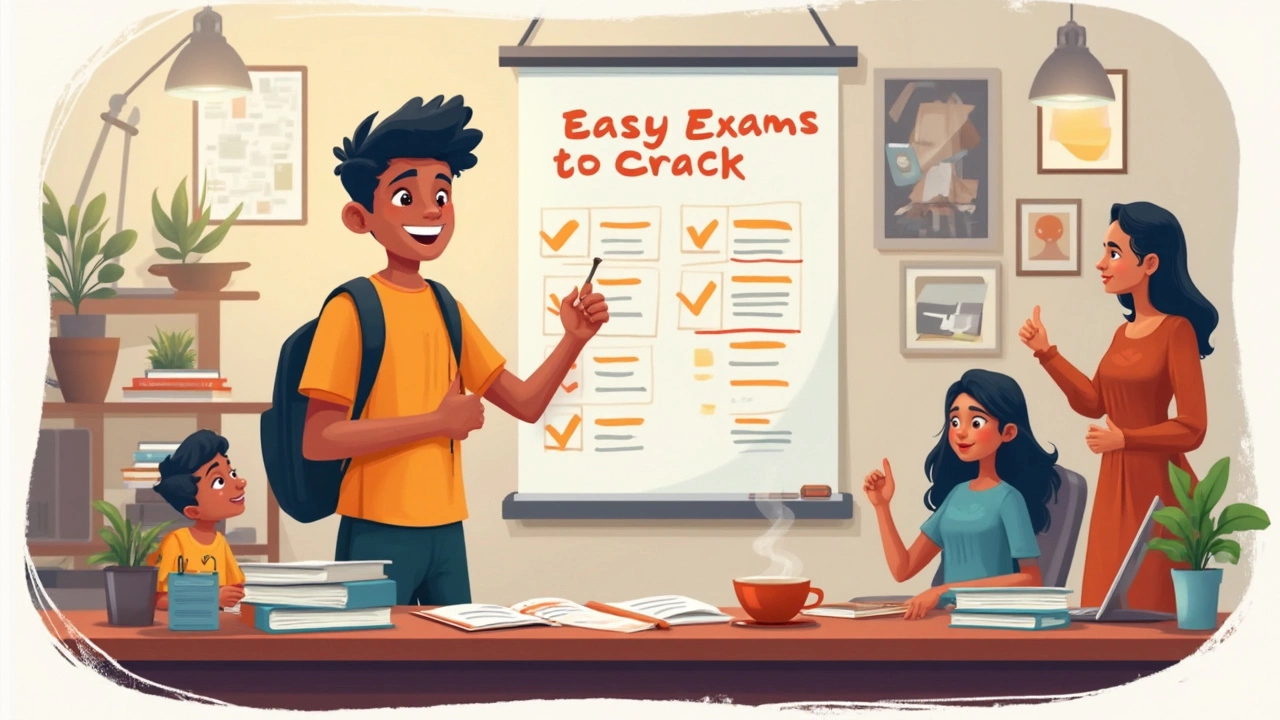Picture this: you’re sprawled on the floor surrounded by textbooks, highlighters, and half-done flashcards. Your phone keeps buzzing with messages from friends worried about their own exams. If you’ve ever wished that just once, an exam would be, well, not a soul-crushing marathon, you’re not alone. Everyone wants a shortcut, even if it’s a tiny one, especially when jobs, college seats, and sometimes a parent’s legendary pride are on the line. So, is there truly such a thing as an easy competitive exam in India — or anywhere?
What Makes an Exam "Easy"?
Easy is relative. For my buddy, who eats math puzzles for breakfast, the SSC CHSL is doable. For my neighbor, who can write mind-blowing essays but gets nervous at the sight of a pie chart, the easiest competitive exam could be totally different. There’s no single exam that’s a walk in the park for everyone, but a few share certain helpful qualities. First, they don’t have a destructive-to-the-ego syllabus. Think of tests like the RRB Group D, SSC MTS, or state police constable exams. These usually check basic knowledge: math that stops at class 10, general awareness, and maybe a whiff of English.
Let’s face it, competition matters. If you’re aiming for a test where lakhs of students show up for maybe a thousand seats (yup: hello, UPSC!), that’s brutal — no matter how much you prepare. Instead, what you want to look for is an exam that:
- Has a manageable syllabus (nothing too broad or niche).
- Offers a large number of vacancies or selections.
- Features straightforward questions — heavy on reasoning or basic calculation, not rocket science or abstract essays.
- Provides a clear, well-known exam pattern and predictable cut-offs.
- Needs only an average to above-average score to qualify; not someone who lives, eats, and breathes textbooks.
By mid-2025, experts everywhere have agreed that tests like SSC MTS, RRB Group D, IBPS Clerk (for some), and state-level constable or clerk exams fit these conditions best. Take the SSC MTS (Multi-Tasking Staff) exam: It’s non-technical, covers four main areas (Reasoning, English, General Awareness, Quantitative Aptitude), and has no interview phase for many posts. Results are based on a written test and, sometimes, a physical efficiency test. Most candidates agree this exam feels less intimidating than the civil services or banking officer exams.
Want a quick stat-based peek? Check this out:
| Exam Name | Number of Applicants (2024) | Vacancies (2024) | Selection Ratio |
|---|---|---|---|
| SSC MTS | 36,00,000 | 13,000 | ~1:277 |
| RRB Group D | 1,20,00,000 | 1,03,000 | ~1:116 |
| State Police Constable (UP) | 22,00,000 | 60,244 | ~1:36 |
| IBPS Clerk | 16,50,000 | 7,500 | ~1:220 |
You’ll notice that despite a sea of aspirants, the actual difficulty is shaped by the syllabus, the competition’s seriousness, and vacancy count. The lower the applicant-to-seat ratio, the better your odds, so always do the math — it’s worth it.
If you’re wondering if you need to study day and night for these? Most successful candidates say that three to four months of focused prep (with consistent revision and practice mock tests) was enough for them, compared to grinding a year or longer for something like UPSC or JEE.

Easiest Government Exams to Crack: Real Choices
It wouldn’t be fair to just tease you with the idea of easy exams and not name names. Here’s a list of the most commonly agreed “easier” competitive exams across government and public sector jobs by 2025. These are backed by recent stats (don’t forget, vacancies open and close fast!):
- SSC MTS (Staff Selection Commission Multi-Tasking Staff): Best for those who want government security, simple exam format, and a career start after 10th pass.
- RRB Group D: Extensive vacancies, straightforward questions, and no interview stage. If you’ve got physical fitness plus basic academics, this could work for you.
- State Police Constable Exams: Most states (UP, MP, Maharashtra, Rajasthan, Tamil Nadu) organize these regularly. Syllabus is basic, and there’s typically a physical round.
- SSC GD Constable: Short written test covering elementary knowledge. High volume of posts in CAPFs (Central Armed Police Forces).
- IBPS Clerk: Easier to qualify than officer-level banking exams, but still needs a solid grip on basic math, reasoning, and English proficiency. Less focus on general awareness than PO level.
- Delhi University Entrance Test (for some UG courses): If you just finished school and want admissions in DU’s certificate/diploma courses, some of these entrance tests have easy cut-offs and simple formats.
- LIC Assistant Exam: For insurance job hopefuls, the assistant post involves a fairly easy test compared to other insurance or banking jobs at higher ranks.
- Other State Board Clerical/Assistant Recruitment Tests: Some states recruit Junior Assistants for government offices with minimum eligibility and easy questions.
Here’s what a normal SSC MTS or RRB Group D paper usually covers:
- Numerical Ability/Quantitative Aptitude: Questions from class 10 or 12 level — basic arithmetic, percentages, averages, time & work, and simple equations.
- English Language: Grammar, vocabulary, comprehension — nothing advanced.
- General Awareness: Static GK, current affairs, general science.
- Reasoning: Puzzles, classifications, analogies, series, and coding/decoding.
So if you’re one of those who’d prefer to skip deep-dive technical subjects and complex essay writing, these are solid options. That doesn’t mean you don’t have to study, but you might, for once, avoid that dreadful feeling of “where do I even begin?”
Let’s not sugarcoat it, though. Even easy exams require discipline. You’ll still have competition — just maybe not the Olympics of brainpower. So what do real toppers say about cracking these? Here are some tips I picked up while prepping for RRB Group D last year (while Rusty kept my feet warm under the table):
- Mock tests matter the most. Attempt at least one every week leading up to the exam.
- Stick to official syllabi. Don’t get lost in ‘helpful’ WhatsApp forwards full of weird tricks.
- Revision is the secret sauce. You shouldn’t be seeing any new topic a week before D-day.
- Physical rounds (for police or Group D) require consistency — not sudden, last-minute gym plans. If I’d ignored running for a month, there’s no way I’d have passed the physical tests.
- Check cut-off trends from the last three years — you can get a clear idea of the target score.
- Don’t underestimate interview or document verification (if any) — have your papers sorted.
And if you’re still not sure where to start, some states publish previous years’ papers and model tests for free on their recruitment sites. No need to drop cash on expensive coaching unless you honestly can’t break a topic down on your own.

Should You Only Aim for the Easiest Exam?
Picking the easiest competitive exam sounds like a plan, but is that always the best idea? Here’s a twist: sometimes, chasing “easy” might actually cost you more time. How? Let’s say you clear the SSC MTS or state constable exam fast. The salary and promotions might not match your ambitions. You could find yourself preparing for a tougher exam later or feeling stuck with fewer growth options.
Then there’s burnout. Bouncing between multiple “easy” attempts can make you lose focus. It might feel as though you’re busy, but you’re not really moving ahead. I remember chatting with a guy at my old coaching center. He’d cleared back-to-back easy clerical exams but switched jobs every year because he never felt satisfied. If you know you won’t be content in a desk job or want something technical or creative, think bigger. Tougher exams, although overwhelming, might open doors to more exciting opportunities.
But maybe this is your stopgap strategy — a way to get job security while you plan your next move. That’s a smart play. Quick earning is never a bad thing, especially with inflation doing laps around us like Rusty at full zoomies in the park.
The sweet spot? Know your strengths and limits. If you genuinely struggle with memorizing laws or advanced science, tilting toward the easier exams makes sense. But don’t do it just because everyone else is saying “it’s easy, bro.” In 2025, job markets are fast-moving. Developing one or two basic skills — communication, data entry, logical thinking — can help in most easy competitive exams.
Need a little inspiration? Did you know that over 40% of candidates who cleared Group D exams in 2024 were first-time test-takers with no coaching? It’s not about how hard you try, but how smartly you prep and align with the exam’s patterns.
- Research every post’s work life, salary, promotion tracks.
- Prepare a realistic schedule. Plug in breaks, dog walks, or ice cream runs — whatever floats your boat.
- Focus on mock papers. A high score in last year's cut-off is a good sign.
- Don’t panic if you skip a day or two — bounce back, don’t spiral.
So, which is the *easiest competitive exam* to crack? It’s the one where your strengths match the questions, competition is less murderous, and you find enough motivation to push through the preps. For someone out there, it’ll be SSC MTS. For someone else, maybe it’s Group D or a state-level clerk. Find what fits for you — and the rest is just about showing up strong and steady, not being the smartest in the room. Maybe with a tail-wagging buddy like Rusty by your side if you’re lucky.


